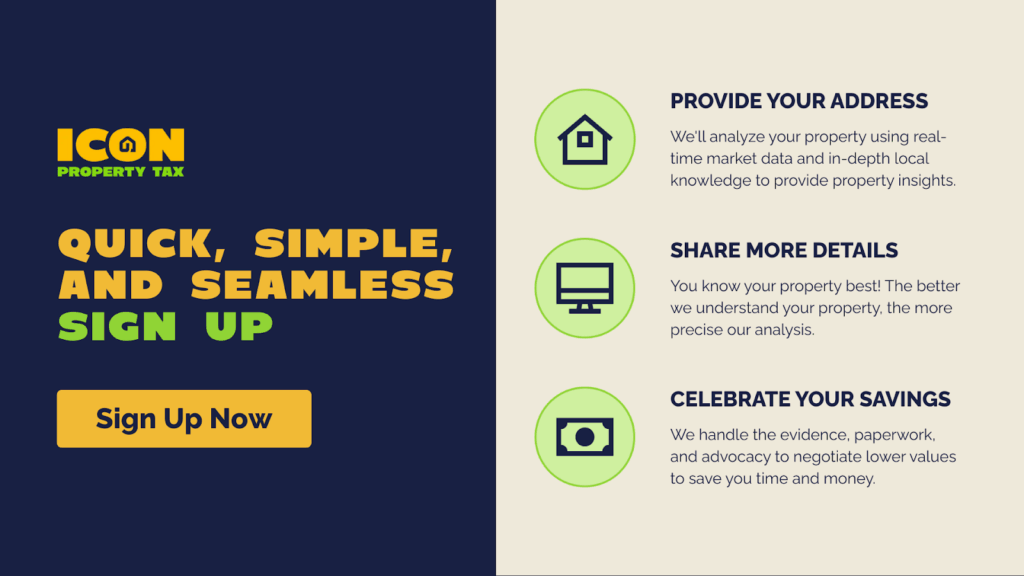Your Texas Relocation Budget: What You Should Plan For
August 7, 2025
Key Takeaways:
- Tax Impact: Texas does not have a state income tax, but high property taxes can significantly affect your housing budget.
- Budget Planning: Many hidden costs, from deposits to utility setup, can strain your finances if not planned.
- Icon Advantage: Icon helps reduce property tax burdens with no upfront cost, saving homeowners money year after year.
At Icon, we’ve helped thousands of Texas property owners lower their tax burdens and protect their investments with zero upfront cost. Our track record? Tens of millions in tax reductions and one of the most streamlined appeal processes in the industry. We’re not just a service but a strategic partner for property owners who expect more from their investment.
Moving to Texas comes with a long list of decisions, and your budget is at the center. From housing and transportation to utilities and taxes, every dollar counts when you’re relocating. While many are drawn to Texas for its booming economy and absence of state income tax, too few plan ahead for the actual cost of establishing a life here. And property taxes? They’re among the highest in the country, making it all the more important to start smart and stay proactive. Relocating should open doors, not strain your finances.
In this piece, we’ll explain what you need to plan for in your Texas relocation budget and how Icon helps you protect what you’ve worked hard to build.
Why Planning Your Texas Relocation Budget Matters
Relocating to Texas has many exciting opportunities, from lower overall taxes to a diverse job market and affordable housing in many areas. But like any move, it requires a clear, well-thought-out budget.
When you plan, you’re better equipped to make informed decisions, from selecting the right city to live in to avoiding unexpected financial stress during the transition. A relocation budget isn’t just about moving trucks and rent; it covers everything from deposits to day-to-day expenses once you arrive.
Factoring in these details early will help you avoid overspending and ensure your new start in Texas is as smooth as possible. This is also the perfect time to evaluate your long-term financial commitments, including property taxes, a significant ongoing cost you’ll want to manage smartly.
Lower your tax burden and protect your investment. If you’re buying property in Texas, partner with Icon to reduce your tax liability.

Housing Costs In Texas: What To Expect
Housing is often the most oversized line item in any relocation budget, and Texas offers a wide range of options depending on where you settle. While cities like Austin and Dallas have seen rising home prices, many areas across the state remain relatively affordable compared to other central U.S. states.
If you’re renting, plan for the first and last month’s rent, security deposits, and possible pet fees. For buyers, consider not just the mortgage but also closing costs, HOA fees, and, critically, property taxes. Texas doesn’t have a state income tax, but property taxes can be significant and vary by county.
That’s where we come in. At Icon, we help Texans appeal their property tax assessments to make sure they’re not overpaying. Zero Upfront Cost, and you only pay when we save you money.
Protect your investment from the start. Smart budgeting begins with accurate housing cost planning and property tax management.
Transportation And Commuting Expenses
Getting around in Texas often means relying on a personal vehicle. While some cities like Dallas and Houston have public transportation, most areas are car-dependent. That means you’ll need to budget for a car (if you don’t already have one), fuel, maintenance, insurance, and possibly tolls, especially if you commute in urban areas.
Gas prices in Texas tend to be lower than the national average, but distances between neighborhoods, work, and amenities can add up quickly. If you’re moving from a walkable city or a place with strong transit infrastructure, prepare for a shift in lifestyle and expenses.
Remember to update your vehicle registration and driver’s license, both of which have fees. These may seem small, but they’re often overlooked in relocation budgets.
Relocating is more than just where you live; it’s about how you live. Budgeting for transportation will help you settle in more comfortably and avoid surprises.
Utilities And Monthly Bills
Once settled into your new Texas home, recurring monthly expenses will quickly become part of your routine. These include essentials like electricity, water, gas, internet, trash collection, and lawn care, especially in suburban or rural areas where certain services aren’t included.
Texas summers are hot, and air conditioning is non-negotiable. That can increase electricity bills, particularly in older homes or larger properties. You’ll also want to explore which providers are available in your area, as utility rates and options vary widely across the state.
Don’t forget to factor in services like streaming subscriptions, mobile phone plans, or security systems; these often get missed in early budgeting conversations, but add up over time.
Proper planning gives you a clearer picture of your ongoing cost of living. Understanding your total property ownership costs, including taxes, is key in this area. Protect your investment by ensuring you’re not overpaying where it matters most.
Taxes In Texas: What You’ll Pay And What You’ll Save
One of the biggest financial draws to Texas is the lack of a state income tax. That alone can translate into thousands of dollars in yearly savings, depending on your income level. But while that’s a significant win, it’s essential to understand where Texas makes up for that lost revenue, primarily through property and sales taxes.
Property taxes in Texas are among the highest in the nation. Rates vary by county and neighborhood, and they can significantly impact your monthly housing costs if you’re buying a home. Investigating property taxes into your relocation budget, not just the mortgage, is essential.
That’s where Icon makes a difference. We specialize in appealing property tax assessments to ensure homeowners only pay what’s fair. No-savings, No-fee Pledge: You don’t pay unless we save you money.
Texas also has a state sales tax of 6.25%, with local jurisdictions adding up to 2% more. Consider this when budgeting for everyday purchases, especially if moving from a state with lower or no sales tax.
Understanding the whole tax landscape helps you make smarter decisions and gives you room to plan for what matters most.
Hidden Or Unexpected Moving Costs
Even the best-planned relocations come with surprises. Many people underestimate the hidden costs involved in a move to Texas. These can include:
- Moving supplies like boxes, tape, and padding
- Storage fees if there’s a gap between move-out and move-in dates
- Utility deposits or connection fees
- Temporary housing or hotel stays during the transition
- Meals out while your kitchen is still packed up
- Pet transportation or boarding
- Time off work, which may affect your income during the move
Little things add up fast. The key to avoiding budget blowouts is planning for the unexpected. Build in a buffer, at least 10 to 15% of your estimated moving cost, for these surprises.
And remember, some costs, like property taxes, don’t stop after the move. They continue year after year. That’s why partnering with Icon is a smart move. Protect your investment and only pay when you save.

How Icon Helps You Save on Property Taxes In Texas
When relocating to Texas, understanding how to manage ongoing property costs is just as important as planning your moving budget. Property taxes can take a serious bite out of your finances, but that’s precisely where Icon steps in. Here’s how we help Texans protect their investment and lower their tax burden:
We Manage The Entire Appeal Process
From the moment your property is assessed, we handle everything, research, paperwork, filing, and representation. You don’t need to interact with the appraisal district or worry about making your case; we do it all for you.
We Work On A No-Savings, No-Fee Model
There’s absolutely no risk to you. You don’t owe us a cent if we don’t reduce your tax bill. No-savings, No-fee Pledge means results are the only thing that matters.
We Use Real Market Data To Support Your Appeal
Our experts analyze recent home sales, neighborhood conditions, and tax trends to strengthen your case. The data gives us leverage to challenge overinflated valuations and win reductions.
We Handle Both Residential And Commercial Properties
Whether you’re a first-time homeowner or managing an investment portfolio, our solutions are tailored to fit. You get the same professional advocacy and tax relief, no matter the property size.
You Stay Informed But Hands-Off
We keep you updated with clear communication, but no heavy lifting is required on your end. It’s a streamlined, stress-free way to ensure you never overpay on property taxes. Lower Your Tax Burden, Protect Your Investment. With Icon, you can stay focused on settling into Texas, while we focus on saving you money.

Final Thoughts
Relocating to Texas offers a fresh start, but it also comes with a new set of financial responsibilities. A thoughtful relocation budget helps you prepare for the expected and unexpected, from rent and utilities to property taxes and commuting costs.
Planning can make your transition smoother and your long-term investment more secure. Whether you’re moving for work, family, or a change of pace, having a clear picture of your financial commitments allows you to make better decisions and avoid costly surprises.
And when it comes to protecting your most significant investment, your home, Icon is here to help you keep more of what’s yours. Sign up today to see how much you could save.
Read Also:
- DuPage County Property Tax Overview: Rates, Assessments, and Billing Cycles
- Kane County Property Tax Overview: Rates, Assessments, And Billing Cycles
- Will County Property Tax Overview: Rates, Assessments, And Billing Cycles
Frequently Asked Questions About Your Texas Relocation Budget
What is the average cost to move to Texas from another state?
The average cost ranges from $1,500 to $5,000, depending on distance, the size of the move, and whether you hire professional movers or rent a truck.
Is Texas more affordable than other states to live in?
Generally, yes. Texas has no state income tax and a lower cost of living than many coastal states, though high property taxes can offset some savings.
What are some low-cost cities in Texas for new residents?
Cities like San Antonio, Lubbock, and El Paso tend to have lower housing costs and overall living expenses than Austin or Dallas.
Should I buy or rent when moving to Texas?
That depends on your financial situation and how long you plan to stay. Renting is often the better option for newcomers getting familiar with the area.
Are moving expenses tax-deductible when relocating to Texas?
Moving expenses are not tax-deductible in most cases unless you’re moving on active-duty military duty due to a change of station.
How long does it take to establish residency in Texas?
After living in Texas for 12 months, you’re considered a resident, which can impact tuition, taxes, and legal residency benefits.
What are the best months to move to Texas to save money?
Late fall and winter (October–February) are generally cheaper for moving due to lower demand for moving services and housing.
Do I need to register my car immediately after moving to Texas?
Yes, you must register your vehicle within 30 days of establishing residency and pass a state inspection first.
What costs are commonly overlooked when planning a move to Texas?
People often forget utility connection fees, cleaning costs for old residences, moving insurance, and costs for setting up services like the internet.
Can I appeal my property tax on my own in Texas?
Yes, but it can be time-consuming and complex. Many homeowners choose services like Icon to handle it professionally with better success rates.

